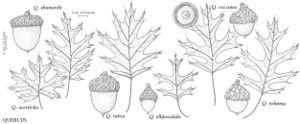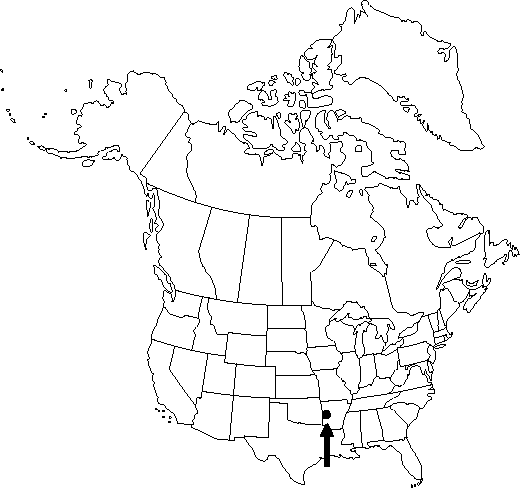Difference between revisions of "Quercus acerifolia"
Fl. N. Amer. 3: 465. 1997.
imported>Volume Importer |
GeoffLevin (talk | contribs) m (Changed synonym to basionym and added publication information, based on the Revisions since print talk page) |
||
| (4 intermediate revisions by 2 users not shown) | |||
| Line 18: | Line 18: | ||
|label=Illustrated | |label=Illustrated | ||
}} | }} | ||
| − | |basionyms | + | |basionyms={{Treatment/ID/Basionym |
| − | |||
|name=Quercus shumardii var. acerifolia | |name=Quercus shumardii var. acerifolia | ||
|authority=E. J. Palmer | |authority=E. J. Palmer | ||
|rank=variety | |rank=variety | ||
| + | |publication_title=J. Arnold Arbor. | ||
| + | |publication_place=8: 54. 1927 | ||
}} | }} | ||
|hierarchy=Fagaceae;Quercus;Quercus sect. Lobatae;Quercus acerifolia | |hierarchy=Fagaceae;Quercus;Quercus sect. Lobatae;Quercus acerifolia | ||
| Line 51: | Line 52: | ||
|rank=species | |rank=species | ||
|parent rank=section | |parent rank=section | ||
| − | |synonyms=Quercus shumardii var. acerifolia | + | |synonyms= |
| − | + | |basionyms=Quercus shumardii var. acerifolia | |
|family=Fagaceae | |family=Fagaceae | ||
|phenology=Flowering spring. | |phenology=Flowering spring. | ||
| Line 62: | Line 63: | ||
|publication year=1997 | |publication year=1997 | ||
|special status=Conservation concern;Endemic;Illustrated | |special status=Conservation concern;Endemic;Illustrated | ||
| − | |source xml=https:// | + | |source xml=https://bitbucket.org/aafc-mbb/fna-data-curation/src/2e0870ddd59836b60bcf96646a41e87ea5a5943a/coarse_grained_fna_xml/V3/V3_2.xml |
|genus=Quercus | |genus=Quercus | ||
|section=Quercus sect. Lobatae | |section=Quercus sect. Lobatae | ||
| Line 68: | Line 69: | ||
}}<!-- | }}<!-- | ||
| − | -->[[Category:Treatment]][[Category:Quercus sect. Lobatae]] | + | --> |
| + | |||
| + | [[Category:Treatment]] | ||
| + | [[Category:Quercus sect. Lobatae]] | ||
| + | [[Category:Revised Since Print]] | ||
Latest revision as of 18:58, 29 February 2024
Trees or shrubs, deciduous, to 15 m. Bark dark gray to almost black, sometimes becoming rough and furrowed. Twigs grayish brown to reddish brown, 1.5-3(-3.5) mm diam., glabrous or sparsely pubescent. Terminal buds gray to grayish brown, ovoid or broadly ellipsoid, 3.5-5.5 mm, glabrous. Leaves: petiole 20-45 mm, glabrous. Leaf blade oblate to broadly elliptic, 70-140 × (60-)100-150(-180) mm, base cordate-truncate to obtuse, margins with 5-7(-9) lobes and 11-48 awns, lobes ovate-oblong or markedly distally expanded, the middle or apical pairs often overlapping, apex acute; surfaces abaxially glabrous or with prominent axillary tufts of tomentum, occasionally with scattered pubescence, adaxially glabrous, secondary veins raised on both surfaces. Acorns biennial; cup saucer- to cup-shaped, 4-7 mm high × 10-20 mm wide, covering 1/4-1/3 nut, outer surface glabrous or puberulent, inner surface light brown to red-brown, glabrous or with ring of pubescence around scar, scales often with pale margins, tips tightly appressed, obtuse or acute; nut ovoid to oblong, 10.5-20 × 9-15 mm, glabrous or pubescent, scar diam. 5-9 mm.
Phenology: Flowering spring.
Habitat: Dry glades, slopes, and ridge tops
Elevation: 500-800 m
Discussion
Of conservation concern.
Quercus acerifolia is known only from four localities in Arkansas: Magazine Mountain, Logan County; Porter Mountain, Polk County; Pryor Mountain, Montgomery County; and Sugarloaf Mountain, Sebastian County (N. Stoynoff and W. J. Hess 1990; G. P. Johnson 1992, 1994). Some specimens suggest hybridization with Q. marilandica and/or Q. velutina, but no hybrids have been reported.
Selected References
None.

